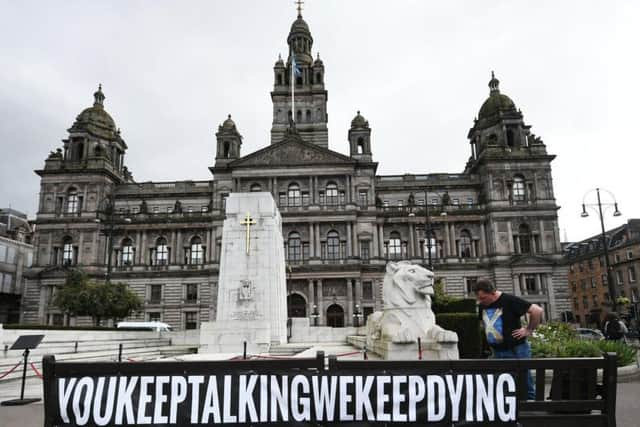Election explained: Will Holyrood or Westminster tackle Scotland's drugs death crisis?
When future social historians look back at how Scotland was in the first two decades of the 21st century, one of the questions they will inevitably ask is why the number of drug-related deaths across the country rocketed so sharply.
How do you explain such a grim story at a time of not insignificant public investment in housing and education, a renewed focus on the underlying causes of poverty, and a steady rise in the numbers of Scots in some kind of paid employment.
Advertisement
Hide AdAdvertisement
Hide AdA report published over the summer found there were 1,187 drug-related deaths registered north of the Border in 2018 - an increase of 27 per cent year-on-year.


Scotland now has a drug-death rate nearly three times that of the UK as a whole. It is also the highest rate in Europe, although other EU nations have different ways of recording drug-related fatalities.
Numbers have been rising every year for over a decade. So what needs to be done?
The SNP election manifesto calls for the devolution of drug laws to Holyrood. The Scottish Conservatives say more money should be provided to addiction services - and drug laws should continue to be set my MPs, not MSPs.
A reserved matter
The issue is complicated as health is a matter devolved to Holyrood, while laws on drug-consumption are set at Westminster.
In Glasgow, the local health board - backed by the council and the Scottish Government - has called for the introduction of a drug consumption room (DCR) in the city. Campaigners say such a service would encourage addicts into treatment and cut down on the rising number of addicts who are sharing dirty needles on city streets.
But the UK Government has steadfastly refused to allow such a scheme.
The Lord Advocate, James Wolffe QC told MSPs earlier this year that while he does have the power to instruct police officers not to refer people caught with illegal drugs for criminal proceedings, this alone would not lead to DCRs becoming a reality.
Advertisement
Hide AdAdvertisement
Hide AdAnd the Scottish Drugs Forum - an independent charity - has pointed out that if DCRs were to make a meaningful impact on Scotland's drug death toll, they would need to operate across the country, not just in Glasgow.
A report published in November by the Scottish Affairs Committee said the fundamental causes of problem drug use required “radical, whole-system change”, rather than piecemeal reform.
It added: “Both the UK and Scottish governments must work together to implement an integrated, cross-departmental, and cross-government approach to drugs, which fully utilises the potential impact of joined-up policing, justice, employment, welfare, housing, physical and mental health policies and services.”
Funding
Opposition parties say the Scottish Government could already be doing more - largely by allocating increased funding to organisations that specialise in addiction issues.
Alcohol and Drug Partnerships (ADPs) which provide vital frontline services around Scotland, have endured successive real terms cuts to their budgets in recent years, with funding shrinking by 6.3 per cent between 2014/15 and 2018/19.
The SNP announced an additional £20m per year in 2018, but it has been argued that this merely took services just past their original funding levels.
Tom Wood, a former chief constable, said "there has been precious little progress since ‘The Road to Recovery’ initiative was championed by Fergus Ewing over 10 years ago".
He added: "Since then, local action teams have suffered severe budget cuts, losing services and impetus."
